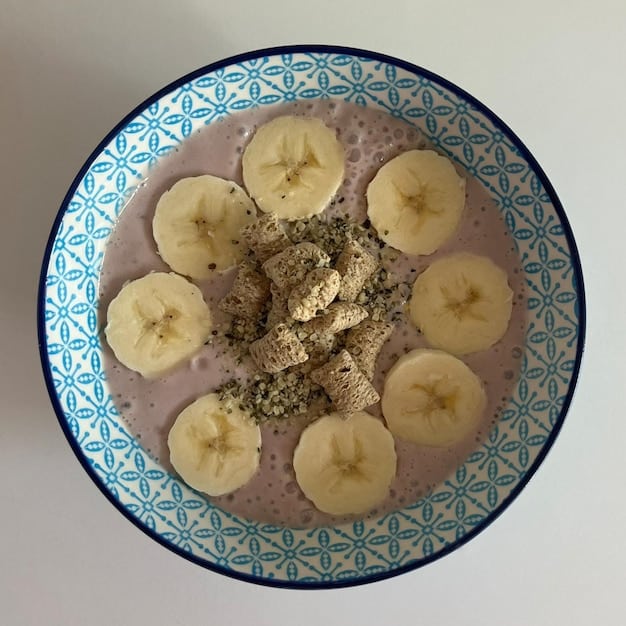Beat the Afternoon Slump: Proven Nutrition Strategies for All-Day Energy

Beat the Afternoon Slump: Nutrition Strategies to Maintain Energy Levels All Day Long by focusing on balanced meals, consistent hydration, and strategic snacking to stabilize blood sugar and prevent energy crashes.
Do you often find yourself struggling with a dip in energy come afternoon? You’re not alone. The afternoon slump is a common experience, but beat the afternoon slump: nutrition strategies to maintain energy levels all day long are easier to implement than you might think. Let’s explore practical ways to keep your energy levels consistent throughout the day through mindful eating habits.
Understanding the Afternoon Slump
The afternoon slump is a common occurrence for many, characterized by feelings of fatigue, decreased focus, and sometimes even irritability. But what causes this midday energy crash? Understanding the underlying reasons can help us implement targeted nutrition strategies.
The Science Behind the Slump
Several factors contribute to the afternoon slump, including our natural circadian rhythms, blood sugar fluctuations, and the types of food we consume earlier in the day. A large, carbohydrate-heavy lunch can lead to a rapid spike and subsequent crash in blood sugar, leaving you feeling drained.
Common Culprits in Your Diet
Certain dietary habits can exacerbate the afternoon slump. These often include skipping breakfast, relying on sugary snacks for quick energy, and not drinking enough water throughout the day. Identifying these habits is the first step toward making positive changes.
- Skipping meals, especially breakfast, can disrupt blood sugar levels.
- Consuming refined carbohydrates leads to rapid energy spikes and crashes.
- Dehydration can cause fatigue and decreased cognitive function.
By understanding these factors, we can begin to make informed choices about what and when we eat, helping us maintain steady energy levels throughout the day. Addressing these habits is crucial for preventing that disruptive afternoon slump.
The Importance of a Balanced Breakfast
Starting your day with a balanced breakfast is one of the most effective ways to prevent the afternoon slump. A well-composed breakfast sets the stage for stable blood sugar and sustained energy.
Components of a Power Breakfast
A power breakfast should include a combination of protein, complex carbohydrates, and healthy fats. Protein helps keep you feeling full and supports muscle function, while complex carbohydrates provide a steady release of glucose for energy. Healthy fats contribute to satiety and overall health.
Breakfast Ideas to Fuel Your Morning
Consider options like oatmeal with nuts and berries, Greek yogurt with granola and fruit, or eggs with whole-wheat toast and avocado. These choices provide a variety of nutrients and sustained energy release.

- Oatmeal with nuts and berries offers fiber and sustained energy.
- Greek yogurt with granola and fruit provides protein and complex carbs.
- Eggs with whole-wheat toast and avocado is a protein-rich and balanced meal.
Incorporating these elements into your morning routine can significantly impact your energy levels and overall well-being. A balanced breakfast can help regulate your appetite and prevent overeating later in the day, further contributing to stable energy.
Lunchtime Strategies for Sustained Energy
Lunch is a crucial meal for maintaining energy levels throughout the afternoon. A well-planned lunch can prevent the dreaded slump by providing the necessary nutrients for sustained focus and productivity.
Building a Balanced Lunch Plate
Aim for a balanced plate that includes lean protein, complex carbohydrates, and plenty of vegetables. Lean protein sources like chicken, fish, or beans help keep you feeling full, while complex carbohydrates such as whole grains or sweet potatoes provide a steady release of energy. Vegetables offer essential vitamins, minerals, and fiber.
Lunch Meal Prep Ideas
Meal prepping your lunches can save time and ensure you have healthy options available. Consider preparing a large batch of quinoa or brown rice, grilling chicken or fish, and chopping vegetables on the weekend. Assemble your lunches each day with these prepped ingredients for a quick and nutritious meal.
- Prepare quinoa or brown rice in advance for a complex carbohydrate base.
- Grill chicken, fish, or tofu for a lean protein source.
- Chop a variety of vegetables for added nutrients and fiber.
By preparing ahead, you can easily create balanced lunches that support sustained energy levels. This approach not only helps prevent the afternoon slump but also promotes healthier eating habits overall. Planning your meals ensures you’re consuming a variety of nutrients to keep you feeling your best.
Smart Snacking to Maintain Energy Levels
Snacking can be a valuable tool for maintaining consistent energy levels between meals, but it’s important to choose snacks that provide sustained energy rather than a quick sugar rush. Smart snack choices can help prevent blood sugar crashes and keep you feeling focused.
Choosing Nutrient-Dense Snacks
Opt for snacks that are rich in protein, fiber, and healthy fats. These nutrients help slow down the absorption of glucose into the bloodstream, preventing rapid spikes and crashes in blood sugar. Avoid snacks that are high in sugar and refined carbohydrates, as these can contribute to the afternoon slump.
Healthy Snack Options
Good snack options include a handful of nuts, a small piece of fruit with a tablespoon of nut butter, Greek yogurt, or a hard-boiled egg. These choices provide a combination of nutrients that support sustained energy levels.

- A handful of nuts provides healthy fats and protein.
- Fruit with nut butter offers a combination of fiber, healthy fats, and natural sugars.
- Greek yogurt is a good source of protein and probiotics.
Snacking strategically can help bridge the gap between meals and prevent overeating at your next meal. Paying attention to your body’s hunger cues and choosing nutrient-dense snacks can significantly impact your daily energy levels.
Hydration: The Unsung Hero of Energy
Staying properly hydrated is essential for maintaining energy levels throughout the day. Dehydration can lead to fatigue, decreased cognitive function, and headaches, all of which can contribute to the afternoon slump.
Why Hydration Matters
Water is involved in nearly every bodily function, including energy production. When you’re dehydrated, your body has to work harder to perform these functions, leading to feelings of fatigue. Adequate hydration ensures that your body can operate efficiently and maintain consistent energy levels.
Tips for Staying Hydrated
Carry a water bottle with you throughout the day and refill it regularly. Set reminders on your phone to drink water, and make it a habit to drink a glass of water before each meal or snack. You can also incorporate hydrating foods, such as fruits and vegetables with high water content, into your diet.
- Carry a water bottle and refill it regularly.
- Set reminders to drink water throughout the day.
- Eat hydrating foods like watermelon, cucumber, and spinach.
Prioritizing hydration is a simple yet powerful way to combat fatigue and maintain optimal energy levels. Aim to drink enough water to keep your urine a light yellow color, indicating that you are adequately hydrated. Staying hydrated complements all other nutrition strategies for sustained energy.
Mindful Eating Practices
Mindful eating involves paying attention to your food, your body’s hunger cues, and the eating experience. Cultivating mindful eating habits can help prevent overeating, improve digestion, and support sustained energy levels throughout the day.
Paying Attention to Hunger Cues
Learn to distinguish between genuine hunger and emotional eating. Before reaching for a snack, ask yourself if you’re truly hungry or if you’re eating out of boredom, stress, or habit. Eating when you’re truly hungry can help prevent overeating and maintain stable blood sugar levels.
Savoring Each Bite
Take the time to savor each bite of your food, paying attention to the taste, texture, and aroma. Eating slowly and mindfully allows your body to register fullness, preventing overeating and promoting better digestion.
- Distinguish between true hunger and emotional eating.
- Savor each bite, paying attention to the taste and texture.
- Eat slowly and without distractions to promote better digestion.
Practicing these techniques can help you develop a healthier relationship with food and support sustained energy levels. Mindful eating complements all other nutrition strategies by encouraging you to make more conscious and deliberate food choices.
| Key Point | Brief Description |
|---|---|
| 🍳 Balanced Breakfast | Start your day with protein, complex carbs, and healthy fats for sustained energy. |
| 🥗 Balanced Lunch | Combine lean protein, complex carbs, and veggies to avoid the afternoon slump. |
| 🍎 Smart Snacking | Choose snacks high in protein, fiber, and healthy fats to maintain stable energy levels. |
| 💧 Stay Hydrated | Drink water throughout the day to prevent fatigue and maintain cognitive function. |
Frequently Asked Questions (FAQ)
▼
The afternoon slump can be caused by a combination of factors, including your body’s natural circadian rhythms, blood sugar fluctuations from eating carbohydrate-heavy meals, and dehydration. Skipping meals can also play a role.
▼
A balanced breakfast is key. Include protein (eggs, yogurt), complex carbohydrates (oatmeal, whole-grain toast), and healthy fats (nuts, avocado). This combination provides sustained energy throughout the morning.
▼
Yes, limit sugary snacks and refined carbohydrates like white bread, pastries, and sugary drinks. These can cause rapid spikes and crashes in blood sugar, leading to fatigue and the dreaded afternoon slump.
▼
Hydration is crucial. Dehydration can lead to fatigue, headaches, and decreased cognitive function. Drink water throughout the day and incorporate hydrating foods like fruits and vegetables into your diet to stay well-hydrated.
▼
Opt for snacks that are rich in protein, fiber, and healthy fats. Good options include a handful of almonds, an apple with peanut butter, Greek yogurt, or a hard-boiled egg to keep you feeling energized.
Conclusion
By implementing these nutrition strategies, you can effectively beat the afternoon slump and maintain consistent energy levels throughout the day. Focusing on balanced meals, smart snacking, proper hydration, and mindful eating habits will contribute to improved focus, productivity, and overall well-being. Make these changes a part of your daily routine to experience a sustained boost in energy and vitality.





